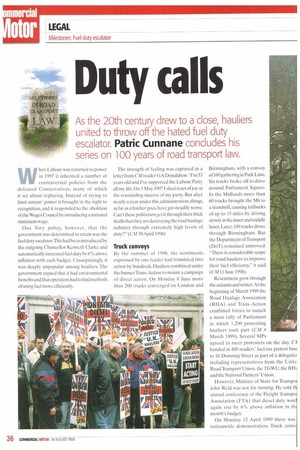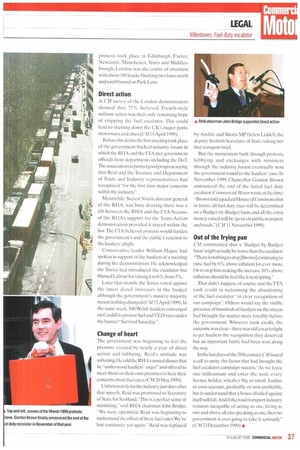Du t y calls
Page 36

Page 37

If you've noticed an error in this article please click here to report it so we can fix it.
As the 20th century drew to a close, hauliers united to throw off the hated fuel duty
escalator. Patric Cunnane concludes his
series on 100 years of road transport law.
.„, hen Labour was returned to power IN in 1997 it inherited a number of contraversial policies from the defeated Conservatives, many of which it set about replacing. Instead of trying to limit unions' power it brought in the right to recognition, and it responded to the abolition of the Wages Council by introducing a national minimum wage.
One Tory policy, however, that the government was determined to retain was the fuel duty escalator.This had been introduced by the outgoing Chancellor Kenneth Clarke and automatically increased fuel duty by 6% above inflation with each budget. Unsurprisingly, it was deeply unpopular among hauliers. The government argued that it had environmental benefits and that operators had to find methods of using fuel more efficiently. The strength of feeling was captured in a letter from CM reader GA Donaldson."I'm 53 years old and I've supported the Labour Party all my life. On 1 May 19971 shed tears of joy at the resounding success of my party. But after nearly a year under this administration, things, as far as a haulier goes, have got steadily worse. Can't these politicians get it through their thick skulls that they are destroying the road haulage industry through extremely high levels of duty?" (CM 30 April 1998) Truck convoys By the summer of 1998, the sentiments expressed by one reader had translated into action by hundreds. Hauliers combined under the banner Trans-Action to mount a campaign of direct action. On Monday 8 June more than 200 trucks converged on London and Birmingham, with a convoy of 160 gathering in Park Lane. Six trucks broke off to drive around Parliament Square. In the Midlands more than 60 trucks brought the M6 to a standstill, causing tailbacks of up to 15 miles by driving slowly in the inner and middle lanes. Later, 100 trucks drove through Birmingham. But the Department of Transport (DoT) remained unmoved: "There is considerable scope for road hauliers to improve their fuel efficiency," it said (CM 11 June 1998).
Resentment grew through the autumn and winter.At the beginning of March 1999 the Road Haulage Association (RHA) and Trans-Action combined forces to launch a mass rally of Parliament in which 1,200 protesting hauliers took part (CM 4 March 1999). Several MPs agreed to meet protesters on the day.
handed in 400 readers' fuel-tax protest faxe to 10 Downing Street as part of a delegatio including representatives from the Unite Road Transport Union, the TGWU, the RH and the National Farmers' Union.
However, Minister of State for Transpo John Reid was not for turning. He told t annual conference of the Freight Transpo Association (FTA) that diesel duty wou again rise by 6% above inflation in th month's budget.
On Monday 12 April 1999 there was nationwide demonstration. Truck eons' protests took place in Edinburgh. Exeter, Newcastle. Manchester, Truro and Middlesbrough. I .ondon was the centre of attention with about 5110 trucks blocking two lanes north and southbound on Park Lane.
Direct action A CM survey of the London demonstrators showed that 75% believed French-style militant action was their only remaining hope of stopping the fuel escalator. This could lead to shutting down the UK's major ports, motorways and cities (CM 15 April 1999).
Before this demo,the first meeting took place of the government-backed industry forum in which the RI IA and the ETA met government officials from departments including the DoT. The associations reported good progress. saving that Reid and the Treasury and Department of Trade and Industry representatives had recognised "for the first time major concerns within the industry".
Meanwhile, Steven Norris, director general of the RI IA. was busy denying there was a rift between the RHA and the FIA because of the RI1A's support for the Trans-Action demonstration provided it stayed within the law. The FIA believed protests would harden the government's and the public's reaction to the hauliers plight.
Conservative leader William Hague had spoken in support of the hauliers at a meeting during the demonstration. He acknowledged the Tories had introduced the escalator but blamed Labour for raising it to 6% from 5%.
Later that month, the Tories voted against the latest diesel increases in the budget although the government's massive majority meant nothing changed (CM 22 April 1999). In the same week, 5()0 Welsh hauliers converged on Cardiff to protest fuel and VED rises under the banner 'Survival Saturday".
Change of heart
The government was beginning to feel the pressure created by nearly a year of direct action and lobbying. Reid's attitude was softening.He told the RHA's annual dinner that he "understood hauliers' anger" and offered to meet them on their own premises to hear their concerns about fuel rates (CM 20 May 1999).
Unfortunately for the industry, just days after that speech, Reid was promoted to Secretary of State for Scotland. "This is a perfect sense of mistiming." said RHA chairman John Bridge. "We were optimistic Reid was beginning to understand the effect of these fuel rates. We've lost continuity yet again." Reid was replaced by Airdrie and Shotts MP Helen Liddell, the deputy Scottish Secretary of State, taking her first transport brief.
But the momentum built through protests, lobbying and exchanges with ministers through the industry forum eventually won the government round to the hauliers' case. In November 1999, Chancellor Gordon Brown announced the end of the hated fuel duty escalator. Commercial Motor wrote at the time: "Brown told a packed House of Commons that in future all fuel duty rises will be determined on a Budget-by-Budget basis, and all the extra money raised will be spent on public transport and roads" (CM 11 November 1999) Out of the frying pan CM commented that a 'Budget-by-Budget basis' might actually be worse than the escalator: "There is nothing to stop [Brown] continuing to raise fuel by 6% above inflation for ever more. Or to stop him making the increase 10% above inflation should he feel like it next spring."
That didn't happen, of course, and the ETA took credit in welcoming the abandoning of the fuel escalator "in clear recognition of our campaign". Others would say the visible presence of hundreds of hauliers on the streets had brought the matter more forcibly before the government. Whoever took credit, the outcome was clear—there was still a war to fight to get hauliers the recognition they deserved but an important battle had been won along the way.
In the last days of the 20th century CM issued a call to unity, the factor that had brought the fuel escalator campaign success. "As we leave one millennium and enter the next, every licence holder, whether big or small, haulier or own-account, profitable or non-profitable, has to understand that a house divided against itself will fall.And if the road transport industry remains incapable of acting as one, living as one and above all else speaking as one, then no government is ever going to take it seriously." (CM 23 December 1999) •
























































































































































































